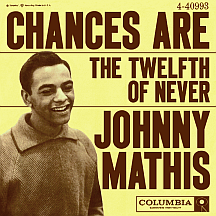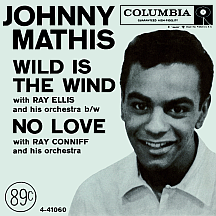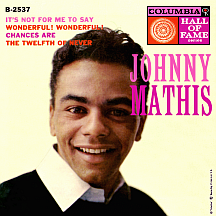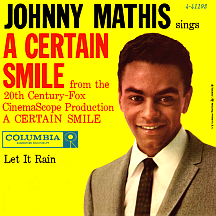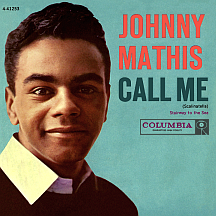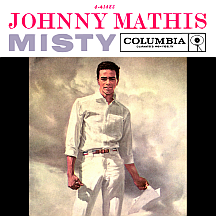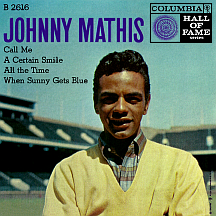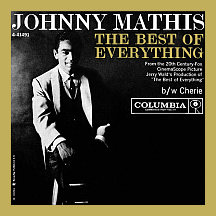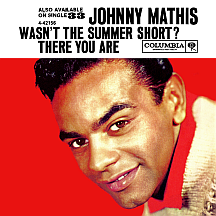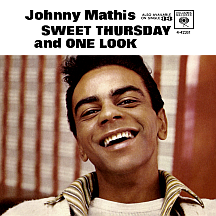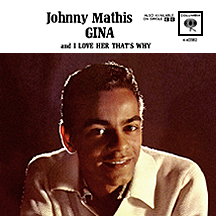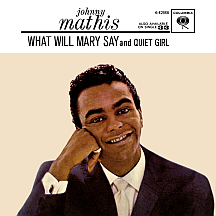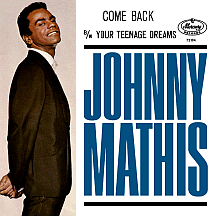JOHNNY MATHIS
When George Avakian, head of the jazz department at Columbia Records, brought 20-year-old singer/track star Johnny Mathis to America's leading record company, it was with the intention of positioning him as a jazz singer, a move that would likely limit his exposure despite the success many jazz artists have attained. Columbia took an unusual tactic with the promising vocalist, skipping the standard procedure of releasing a single to radio; instead, they introduced him to the world with a full album featuring well-crafted versions of standards by the likes of Duke Ellington and Cole Porter and other selections irresolutely more pop than jazz. The world barely noticed...or cared. Turns out it was his destiny to sing popular, tastefully-arranged romantic pop songs, his own preference, though he was capable of much more. Later, of course, he got to do whatever he wanted, once he'd become one of the most successful singing stars of the 20th century's latter half. As he quickly found out, having a failure the first time out didn't matter one bit.
Born in 1935 in the east Texas town of Gilmer, John Royce Mathis, the middle child of seven, remained in the Lone Star state with his grandparents and one younger sister when his family moved to San Francisco around the time of World War II; had he stayed there, his athleticism might ultimately have become a higher priority. Joining his family later, he developed an interest in music after his father, Clement Mathis, bought an upright piano. Billy Eckstine, Nat "King" Cole and a number of female singers were John's childhood favorites; as he grew older and discovered his singing voice had a rather high range, the influence of Ella Fitzgerald, Sarah Vaughan, Peggy Lee and Lena Horne became all that much stronger and he began to emulate their styles. His entire family had a knack for music, whether it be singing or playing an instrument, but John was the only one to make a career of it.
Early in his teenage years he began sneaking into San Francisco nightclubs (or making attempts, at least); needless to say, he matured quickly as witness to the way adults entertained themselves. During high school in the early '50s, John's interest in sports took precedence; he was an outstanding basketball player at George Washington High and even more impressive in track and field, earning a scholarship from San Francisco State College in 1953. Around that time he met Helen Noga, part owner of the Black Hawk Club, the Bay Area spot where America's top tier jazz stars regularly performed. Impressed with his vocal ability, she recommended him for a job performing weekends at Ann Dee's 440 Club, a small nightery where he was able to develop his technique while continuing his studies. Avakian showed up at some point and Noga made sure he caught one of Johnny's sets at the 440. An opportunity to try out for the 1956 Olympics came up just as Avakian offered him a contract with Columbia. The timing was unfortunate, since Johnny would have preferred to experience both things. He went to New York to make records, never regretting his decision.
Avakian's plan was to put out an album without an accompanying single, an unusual way to establish an artist like Mathis. That first effort, simply titled Johnny Mathis, was marketed as a jazz album and failed miserably; no one could have predicted his eventual domination of the album market. Very little occurred during Johnny's first year in New York. Helen Noga kept a close eye on his affairs, shuttling between N.Y. and S.F. where she ran her nightclub. She was opposed to Columbia's promotional tactics, making a convincing argument to Johnny that he would never make much money as a jazz singer. Mitch Miller stepped in and altered the game plan, though the fine line between Johnny's so-called jazz recordings of 1956 and what came later is a negligible one.
Miller, Columbia's top dog who had the final say on all things artist-related, produced the first Mathis single, matching the singer with talented, up-and-coming pop music songwriters, resulting in two tracks with huge hit potential: "Wonderful! Wonderful!" (a Marvin Fisher-Jack Segal song) and "When Sunny Gets Blue" (written by Sherman Edwards and Ben Raleigh). The record took much longer than usual to develop at radio; after debuting on the national charts in February 1957, the "Wonderful" side bounced around for a few months in the list's mid-regions.
A chance to act in a Hollywood movie presented itself; Johnny had a small role in Lizzie (starring Eleanor Parker), performing both sides of his next single. "It's Not For Me to Say" had been composed by Robert Allen and Al Stillman, already successful supplying songs for several of the label's acts, most notably The Four Lads. Flip side "Warm and Tender" was written by struggling songwriters Hal David and Burt Bacharach, hitless until their fortunes were reversed with this single. Despite its release, the first disc refused to die and went top 40 in May, joined after a couple of weeks by the new single. Building airplay and sales with each passing week, by July "It's Not For Me to Say" was in the top ten while "Wondeful! Wonderful!" settled into the top 20, more than five months after its debut. A new Mathis album, not surprisingly titled Wonderful Wonderful, curiously didn't include the title track, yet the LP kicked into high gear and became a best seller.
Disc jockeys were ahead of the public in identifying Johnny's appeal. When "Chances Are," another Allen-Stillman tune, blasted onto the chart in mid-September, the previous two singles were still selling strong and Johnny was receiving frequent exposure through radio and television appearances. The song reached number one on Billboard's airplay charts in October, topping the Cash Box best sellers as well, then the flip side, "The Twelfth of Never" (by the prolific songwriting team of Jay Livingston and Paul Francis Webster), came on as a fourth hit, joining "Chances Are" in the airplay top ten in November.
A bit of confusion arose among country fans familiar with Jimmy and Johnny (the duo had a top ten C&W hit, "If You Don't Somebody Else Will," on Chess in 1954). Arkansan Jimmy Lee Fautheree and another Texan named Johnny Mathis had performed together since the early '50s; Mathis started a solo career in 1957, coincidentally at the same time the young pop singer with the same name was breaking big. By '59 he was billing himself as Country Johnny Mathis, obviously caving in to the by-then multi-million-selling upstart. The two Johnny Mathises coexisted peacefully for years afterward.
As he had with other Columbia artists, Mitch Miller took control of Johnny's career, calling the shots at every turn in those formative years of the late '50s. Johnny went along with him, since everything he suggested (or demanded!) worked. Mitch had a knack for sniffing out songs that best suited Johnny's style; his image and romantic, softly-rendered vocal delivery connected with untold millions of fans. Earlier he had appeared at many college campuses, graduating to larger concert venues when record sales took off. "Wild is the Wind," the theme from the movie starring Anthony Quinn and Anna Magnani, and its flip side, the haunting "No Love (But Your Love)," arrived in December '57, giving him five songs on the music chart at once; this type of overlap continued for two full years. "Wild" landed an Academy Award nomination for its composers, Dimitri Tiomkin and Ned Washington, and Johnny reached his largest audience yet when he performed it on the March 26, 1958 Oscar broadcast.
Johnny's singles consistently sold well, but his albums went above and beyond. Warm had a long run starting in late '57; a few months later, Johnny's Greatest Hits appeared, a collection of his first ten singles sides ("Come to Me" the most recent) with the A side of the next hit, "All the Time," and one other song, "I Look at You." This stellar collection endured like no other music industry longplay before it, hitting number one on the album charts in May '58 before settling in for a long, record-breaking run. Other hits of 1958 include "Teacher, Teacher" (a rare uptempo tune) and "Call Me." An album of holiday songs with the obvious title Merry Christmas turned out to be tailor-made to the singer's sensibility; a top seller in many subsequent Decembers, it paved the way for several seasonal follow-ups.
He appeared in another theatrical film, "A Certain Smile" starring Joan Fontaine, strictly for the purpose of singing the title song written by Sammy Fain and lyricist Webster. For the second year in a row one of his hits wound up getting an Oscar nomination, though he was passed over for the awards show; actor-singer John Raitt did the honors this time. Johnny's acting career effectively ended with this second effort; the process of appearing onscreen made him uncomfortable and he restricted his future film work to singing appearances or an occasional cameo role.
"Misty," a jazz instrumental written and recorded in 1954 by Erroll Garner and his Trio (lyrics were added by songwriting legend Johnny Burke), had been recorded by many artists in the five years after its debut; Johnny's hit version has become more closely associated with him than anyone else, driving sales of the album Heavenly (number one in November 1959) into the millions. He received his first of four Grammy nominations for his recording of "Misty" in the category Best Vocal Performance, Male. Johnny delivered many great versions of stage and film tunes including "You Are Beautiful" (from Flower Drum Song) and "Small World" (from Gypsy), both hits in '59. He singled out the songs from West Side Story, composed by Leonard Bernstein and Stephen Sondheim, as some of his very favorites; to millions of people, his take on "Maria" (originated by Larry Kert in the Broadway production and sung by Richard Beymer in the film version) is the definitive one.
Johnny's popularity began to fade in the early '60s, though album sales were still solid; he performed again at the Academy Awards on April 9, 1962, singing the nominated "(Love Theme from) El Cid (The Falcon and the Dove)" (penned by Miklos Rozsa and Webster), a song he hadn't recorded. Producer Ernie Altschuler took over the studio controls with a pair of Paul Vance songs; "Gina," cowritten with Leon Carr, went top ten in October '62, the first to reach that level since "Chances Are" five years earlier. The next single, Vance and Edward Snyder's "What Will Mary Say" (featuring the infamously sappy 'Don't go!' girls' plea) hit the top ten in March '63. Both songs appeared on Johnny's Newest Hits, helping propel it into the LP top ten.
Not one to argue with success, Johnny had been quite content following Mitch's orders and letting the various producers call the shots, but by 1963 this lack of control grew wearisome. Rather than continue with Columbia, he signed a contract with Mercury Records that granted him complete freedom in every aspect of his musical output. Johnny had a falling out with Helen Noga at about that time and attorney Ray Haughn replaced her as his manager. Record sales dropped far below the level he'd enjoyed at Columbia (only one Mercury album, The Shadow of Your Smile in 1966, made the top ten). His singles, marketed separately from his albums, include the Vance-Snyder tune "Come Back," "Bye Bye Barbara" (composed by Vance with Jack Segal), "Listen Lonely Girl," Robert Allen's "Take the Time" and the Burton Lane-Alan J. Lerner Broadway theme "On a Clear Day You Can See Forever." All were fine efforts on par with his Columbia material, but none made it very high on the charts.
In the end, the move to Mercury was beneficial to Mathis, if only because it put him in a better position than if he'd stayed at Columbia. He re-upped with his first label in 1967, demanding and receiving far more control than before. The move coincided with Johnny's Greatest Hits wrapping up a run of more than nine straight years on Billboard's album charts, a record-breaking achievement at the time. Still, minor hit 45s and modest-selling albums continued to be the norm for the singer during the next decade. His vocal rendition of Nino Rota, Larry Kusik and Edward Snyder's "(Love Theme from) Romeo and Juliet (A Time For Us)" (which Henry Mancini had instrumentalized to the top of the charts in June '69) is considered one of his best works.
Of his many early 1970s releases, "I'm Coming Home" was a number one Easy Listening chart hit in the fall of '73. In 1978, for the first time, he recorded a duet; Deniece Williams had been recording for ten years (with only one hit, "Free" in '77, to her credit) and jumped at the chance to work with Johnny. "Too Much, Too Little, Too Late" (Nat Kipner and John Vallins wrote it) became a number one hit and million seller in June 1978. Johnny often collaborated with women singers after this; he appeared with Jane Olivor at the April '79 Oscars singing "The Last Time I Felt Like This" from Same Time, Next Year. Natalie Cole, Gladys Knight and Dionne Warwick cozied up to Johnny onstage and in the recording studio over the next few years. He and Deniece Williams collaborated a few more times during the 1980s; "Without Us," their version of the theme for the TV sitcom Family Ties (the original was by Mindy Sterling and Buckinghams lead singer Dennis Tufano), gave them weekly exposure throughout most of the show's seven-year run.
Johnny's love of sports ultimately led him to the golf course, the place you'd be most likely to find him these last 40-plus years. People have speculated on the singer's sexual preference for decades; he hinted at the truth at one point in the 1980s but withdrew his comments after receiving death threats. Waiting until long after society had, for the most part, grown beyond prejudiced attitudes one way or the other, he quietly confirmed his singing, golfing and gay lifestyle. He continues recording and performing for live audiences, though not nearly as often as in his heyday. These days, singer extraordinaire Johnny Mathis spends most of his free time teeing off.
NOTABLE SINGLES:
- Wonderful! Wonderful! /
When Sunny Gets Blue - 1957 - It's Not For Me to Say /
Warm and Tender - 1957 - Chances Are /
The Twelfth of Never - 1957 - Wild is the Wind /
No Love (But Your Love) - 1957 - Come to Me - 1958
- All the Time /
Teacher, Teacher - 1958 - A Certain Smile - 1958
- Call Me - 1958
- Let's Love /
You Are Beautiful - 1959 - Someone - 1959
- Small World /
You Are Everything to Me - 1959 - Misty /
The Story of Our Love - 1959 - The Best of Everything - 1959
- Starbright - 1960
- Maria - 1960
- My Love For You - 1960
- How to Handle a Woman - 1960
- You Set My Heart to Music - 1961
- Wasn't the Summer Short? - 1961
- Sweet Thursday - 1962
- Marianna - 1962
- Gina - 1962
- What Will Mary Say - 1963
- Every Step of the Way - 1963
- Sooner or Later - 1963
- Come Back /
Your Teenage Dreams - 1963 - I'll Search My Heart - 1963
- Bye Bye Barbara - 1964
- Taste of Tears - 1964
- Listen Lonely Girl - 1964
- Take the Time - 1965
- The Sweetheart Tree - 1965
- On a Clear Day You Can See Forever - 1965
- (Love Theme from) Romeo and Juliet (A Time For Us) - 1969
- Midnight Cowboy - 1969
- Pieces of Dreams - 1970
- I'm Coming Home - 1973
- Life is a Song Worth Singing - 1974
- Stardust - 1975
- Too Much, Too Little, Too Late - 1978
by Johnny Mathis and Deniece Williams - Life is a Song Worth Singing - 1978
by Johnny Mathis and Deniece Williams - Friends in Love - 1982
by Dionne Warwick and Johnny Mathis - Simple - 1984


